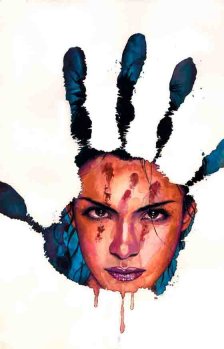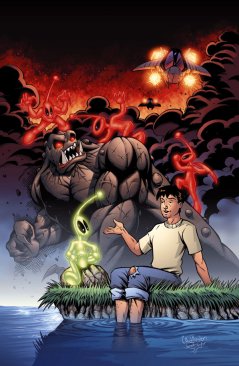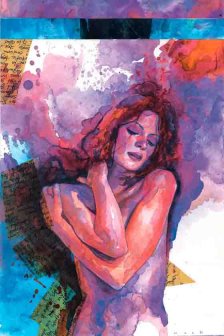Alias #26
writer: Brian Michael Bendis
artists: Michael Gaydos, Mark Bagley, Art Thibert,
and Rick Mays
At last, all of the pieces of Jessica's history
are in place. Or at least as many as we need for this final
emotional roller coaster before the book becomes known as
The Pulse. Still untapped and unexplained are her days
as Knightress (perhaps best left alone) and an alleged career
with The Avengers that Bendis might just as soon we forget
he mentioned.
With this arc, Bendis has also taken a character
we might consider stupid and made him into something terribly
deadly. It's a cool twist for The Purple Man, but one that
is hard to reconcile with what we've known before. Even here
Bendis has to nod to that, as The Avengers fail to capture
The Purple Man, but Daredevil succeeds.
As he did with the recent Daredevil
#50, the writer mixes things up for a variety of artists.
Unlike that book, however, it has uneven results. The appearance
of Bagley still jars when juxtaposed against Gaydos. It's
on purpose, contrasting the mundane reality of Jessica's day
to day with her glory days, as The Purple Man puts it, of
being "…a comic book character," even if it's one we'd never
met before.
However, by using Rick Mays to illustrate
a manga-esque dream sequence (Jessica had recently seen Akira
for the first time), Gaydos' art doesn't just look mundane.
His weaknesses come to the fore. While Gaydos has mastered
drawing plain-looking beautiful people, it's also apparent
that they're the same. Sure, Jean Grey can look like a normal
person, but look again: she has the same face as Jessica.
If not for hair color, they'd be identical.
There's no doubt that Bendis and Gaydos will
bring it all to an exciting psychological head next issue.
But it has taken a little more time than it needed to in order
to get there. Maybe knowing that it's coming to an end anyway
has forced the issue, but Alias seems to have lost
a little steam in trying to flaunt its difference from the
rest of the Marvel Universe.
Rating: 
 Daredevil
#51
Daredevil
#51
story and art: David Mack
As an artist, David Mack certainly pushes
the limits of storytelling. And that's meant in a good way.
His panels challenge the eye, leading the reader in a way
that few since Neal Adams' heyday have.
Proving that he knows his stuff, Mack even
shows off a bit by having Echo paint self-portraits in the
styles of Kahlo, Picasso, Van Gogh, and perhaps a few more
but I'm an English major so I'm out of knowledge here. It's
a flashy move, and if a bit self-indulgent, Mack still pulls
it off with flair.
But such tricks also go a long way to covering
that Mack doesn't actually have much to say here. Echoing
the previous time he spotted Bendis, Mack revives his deaf
femme fatale. In fairness, you knew she had to come back.
Too much was left undone, and The Kingpin's shadow had lessened
enough for Echo to resurface.
Mack rehashes what he established before,
albeit beautifully and lyrically. There are moments of poetry
as a young girl tries to compensate for the sense she will
never have. If the rain makes noise, she wonders, then what
sound does sunshine make?
Such moments just don't fill the book, though.
What Mack does accomplish is reminding me just how much Mark
Steven Johnson ripped from Echo in his film version of Elektra.
Though the arc may have more to offer, right
now this book is one just for the art - gorgeous and innovative
as it is.
Rating: 
 Decoy:
Stranded
Decoy:
Stranded
writer: Michelle Nichols
artists: Courtney Huddleston, Pablo Villalobos and James Taylor
If you're new to Decoy, and many of
you probably will be, this one-shot serves well to get you
up to speed.
Framed by a typical misadventure of Officer
Bobby Luck and his polymorphic alien friend, the tale rehashes
Decoy's origin. As Luck and Decoy have been treed by a bear,
they go over their history together.
In some ways, Nichols' script is easier to
follow than the original telling by Buddy Scalera. It has
the advantage of not being serialized. But it also manages
to gloss over the more uneasy aspects of the character. Though
intentionally extremely cute, Decoy comes from a race of aliens
that are actually psychopathic. And the far more frightening
looking aliens, the Kranch, are the good guys. Nichols makes
it obvious without being graphic, which keeps the story fairly
light.
And really, it ought to be, since Penny Farthing
has teamed Decoy up with Herobear and the Kid.
For those attracted by that earlier team-up,
the book is perfect. Huddleston and the rest of the art team
have a clean cartoony style, with the bright coloring of Mike
Garcia adding to a kid-friendly appearance. So get this to
tide you over until the second part of the Herobear/Decoy
crossover.
If you're already a Decoy fan, you may want
to skip this, as you'll learn nothing new, except perhaps
for a somewhat arbitrary limit on Decoy's abilities. But heck,
if you're a Decoy fan, you already bought the book, and you're
waiting for further adventures.
Rating: 








